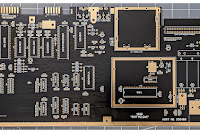Sure, saying "Megapixels don't matter" is a bold claim and a bit clickbaity, but let's think about it logically. What are you doing with your pictures once you've taken them off your camera and on to your computer? Do you do anything with them at all? And what is a megapixel anyway?
Well, let's get the explanations out of the way first. A megapixel (MP) is a million pixels. So, an image taken with your camera that measures 6000 pixels by 4000 pixels equals 24 MP.
In the interests of science, and to prove a point I'm now going to undertake a somewhat exaggerated experiment. I have in my possession my first ever digital camera. And it still works. It's seen better days for sure but so it should - it's 16 years old as I write this. It sports a whopping 1.5 inch LCD display and a 2 megapixel CCD sensor. That's right folks. 2 whole megapixels.
 |
| My first digital camera. Is this the oldest digital camera still in use today? |
And I thought to myself, let's try a little experiment. Let's take a picture with this antique and compare it with something a bit more modern. So, I took my modern DSLR camera and under exactly the same circumstances took the same picture of a prop butterfly with both cameras. I present to you now each of the resulting pictures:
 |
| So was this taken with the 2 megapixel camera? |
 |
| Or was this taken with the 2 megapixel camera? |
Remember, this isn't an experiment on the quality of a lens or depth of field or what has the biggest zoom, this is simply to see if you can tell the difference between a picture taken by a camera with 2 MP and a picture taken by a modern DSLR with significantly more. Is one of these pictures more noticeably crap than the other? Simply put, the answer is no.
The truth of the matter is that here, on this blog, where ALL my pictures are resized so that the long edge is 1000 pixels (and this page resizes them smaller still), it doesn't matter in the slightest whether I took those pictures with a 2 MP museum piece or a 100 MP beast and that is the whole reason I posed the question at the start of this blog - what are you doing with your pictures?
Want to hear another truth? If I was to take the original pictures (i.e. not the resized ones you see here) and printed them as 6" x 4" prints, you wouldn't be able to tell the difference either.
Now, if I was to start making larger prints, say 8" x 6" or 10" x 8" then you would start to see the difference and the larger you print, the more obvious the differences would become. So, I ask the question again - what are you doing with your pictures?
If, as I suspect, many of you are just posting your pictures on social media where they are usually resized drastically, you really don't have to worry about how many MP a camera has at all. Period. It is absolutely irrelevant.
If you are printing at standard sizes (e.g. 6"x4") then, once again, you don't need to worry about MP.
The only time the number of MP a camera has should be of any concern to you at all is if you are printing huge pictures, or you are cropping your pictures to within an inch of their lives (which you might be for nature photography), or if you're a pro and looking to get published in magazines or billboards. For the rest of us mere mortals, it is truly an irrelevance. Camera manufacturers are always trying to tell us that bigger is better - it's one of the selling points of any new camera but I hope this article helps you see through those claims and instead of worrying about numbers, you can spend more time worrying about really important things, like subject, lighting and composition. Whatever the MP count on any camera made in the last five years it's probably more than enough.
And no, I'm not going to tell you which of the pictures above was taken with the 2 MP camera, coz it really doesn't matter.



